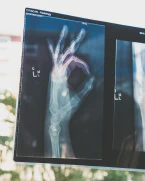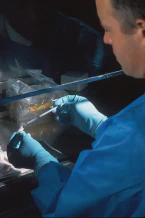The Power of Hand Washing: Understanding the Science and Technique for Proper Hand Hygiene.

How singing happy birthday can save your life
Germs are everywhere, and they pose a significant threat to our health. In fact, according to the video script, emergency physician Dr. Jeffrey VanWingen estimates that we come into contact with 60,000 germs every day. With that many germs around us, it’s no wonder that infections are so prevalent.
Understanding how germs spread is essential to protect yourself and others from infections. As Dr. VanWingen explains in the video, 80% of all infections are spread through our hands. This is because we touch our face about 16 times an hour, which gives germs ample opportunities to enter our bodies through our eyes, nose, and mouth.
So, what can you do to protect yourself and others from germs and infections? Dr. VanWingen recommends washing your hands properly. But not just any quick rinse under the faucet will do. In fact, the video suggests that half of people don’t wash their hands after using the bathroom, and of those who do, 95% aren’t washing their hands properly.
So, how can you make sure that you’re washing your hands effectively? One tip is to sing “Happy Birthday” twice while washing your hands. The time it takes to sing the song is about 20-30 seconds, which is the recommended time to fully immobilize germs and kill them by disrupting their cellular membrane.
Using soap and water, be sure to lather up all parts of your hands, including the back of your hands, between your fingers, cuticles, and fingernails. These are areas where germs tend to hide, so it’s crucial to pay attention to them.
By washing your hands properly and regularly, you can protect yourself and others from infections and even save lives. So the next time you’re tempted to skip the hand washing or just give a quick rinse, remember the importance of proper hand hygiene and how singing “Happy Birthday” can help keep you healthy.
The role of hands in spreading infections
Did you know that our hands play a significant role in spreading infections? According to Dr. Jeffrey VanWingen, emergency physician and speaker in the video script, 80% of all infections are spread through our hands. This is because we touch our face about 16 times an hour, giving germs the perfect opportunity to enter our bodies through our eyes, nose, and mouth.
Despite the fact that our hands are the primary means of germ transmission, there is still a lot of confusion surrounding hand washing. For example, many people believe that a quick rinse under the faucet or a pass of hands under running water is sufficient to wash away germs. However, as Dr. VanWingen points out in the video, this is not the case.
In fact, the video suggests that many people don’t wash their hands properly, with only 50% of people washing their hands after using the bathroom, and 95% of those who do wash their hands not washing them properly. This lack of proper hand hygiene can lead to the spread of infections and even antibiotic resistance.
So, what can you do to prevent the spread of infections through your hands? The answer is simple: wash your hands properly. Washing your hands with soap and water for at least 20-30 seconds is the best way to remove germs from your hands effectively.
However, it’s not just about the length of time you spend washing your hands. It’s also essential to wash all parts of your hands thoroughly, including the backs of your hands, between your fingers, and under your nails. These areas are hotspots for germs and require extra attention.
Proper hand hygiene is critical for our health and well-being, and it’s up to each one of us to take responsibility for our hand washing practices. By understanding the role of hands in spreading infections, the misconception about hand washing, and the importance of washing hands properly, we can all do our part in preventing the spread of infections and keeping ourselves and others healthy.
The science behind hand washing
Hand washing is a simple yet powerful way to prevent the spread of infections. But what makes it so effective? In this blog post, we’ll take a look at the science behind hand washing and how to do it properly.
According to Dr. Jeffrey VanWingen, emergency physician and speaker in the video script, washing your hands with soap and water is the best way to remove germs from your hands effectively. But why is this the case? The answer lies in the way soap works.
Soap contains molecules with two ends: one end is attracted to water, while the other end is attracted to dirt and oil. When you rub soap onto your hands and add water, the soap molecules surround the dirt and oil on your hands, lifting them off your skin and forming tiny particles called micelles.
These micelles then get washed away with the water, taking the germs with them. This is why using soap is essential when washing your hands, as it helps to break down and remove dirt, oil, and germs from your hands.
But soap alone isn’t enough. The proper technique for washing hands is also crucial. According to the video, the recommended time for washing your hands is at least 20-30 seconds. This is the amount of time needed to fully immobilize germs and kill them by disrupting their cellular membrane.
When washing your hands, it’s also important to lather up all parts of your hands, including the backs of your hands, between your fingers, and under your nails. These areas are hotspots for germs and require extra attention.
So, to sum up, the science behind hand washing involves the use of soap to break down and remove dirt, oil, and germs from your hands. Proper technique involves washing your hands for at least 20-30 seconds and paying attention to all parts of your hands.
By understanding the science behind hand washing and the role of soap in hand washing, we can all do our part in preventing the spread of infections and keeping ourselves and others healthy.
The time needed to effectively wash hands
Washing your hands is one of the simplest yet most effective ways to prevent the spread of infections. But how long should you spend washing your hands to make sure you’re doing it effectively? In this blog post, we’ll explore the recommended time for washing your hands and the benefits of doing so.
According to Dr. Jeffrey VanWingen, emergency physician and speaker in the video script, the recommended time for washing your hands is at least 20-30 seconds. This is the amount of time needed to fully immobilize germs and kill them by disrupting their cellular membrane.
To make sure you’re washing your hands for the recommended amount of time, Dr. VanWingen suggests using a fun and simple trick: singing “Happy Birthday” twice. The time it takes to sing the song is about 20-30 seconds, which is the perfect amount of time to fully wash your hands.
By washing your hands for the recommended time, you can effectively remove germs and prevent the spread of infections. The benefits of washing your hands properly are numerous, including reducing the risk of getting sick, preventing the spread of infections to others, and even contributing to the fight against antibiotic resistance.
In fact, the video suggests that proper hand hygiene can save lives. By washing your hands regularly and thoroughly, you’re taking an important step in protecting your health and the health of those around you.
In conclusion, taking care of your health by washing your hands is a simple yet powerful practice. By washing your hands for at least 20-30 seconds and using soap to break down and remove dirt, oil, and germs from your hands, you can prevent the spread of infections and contribute to a healthier and happier community. So next time you’re washing your hands, don’t forget to sing “Happy Birthday” twice and take that extra time to protect your health.
Conclusion
In conclusion, proper hand hygiene is critical for our health and well-being. By understanding the prevalence of germs and infections, the role of hands in spreading infections, and the science behind hand washing, we can all take important steps to prevent the spread of infections and protect our health.
One of the most effective ways to prevent the spread of infections is by washing our hands properly. This involves using soap to break down and remove dirt, oil, and germs from our hands and washing our hands for at least 20-30 seconds. By paying attention to all parts of our hands, including the backs of our hands, between our fingers, and under our nails, we can effectively remove germs and prevent the spread of infections.
The benefits of washing our hands properly are numerous, including reducing the risk of getting sick, preventing the spread of infections to others, and even contributing to the fight against antibiotic resistance. By making hand washing a regular part of our daily routine and taking the time to do it properly, we can all do our part in preventing the spread of infections and keeping ourselves and those around us healthy.
So the next time you’re tempted to skip hand washing or just give a quick rinse, remember the importance of proper hand hygiene and take that extra time to protect your health. It’s a simple yet powerful practice that can make a big difference in our lives and the lives of those around us.












